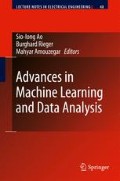Abstract
Students spend much of their life in an attempt to assess their aptitude for numerous tasks. For example, they expend a great deal of effort to determine their academic standing given a distribution of grades. This research finds that students use their absolute performance, or percentage correct as a yardstick for their self-assessment, even when relative standing is much more informative. An experiment shows that this reliance on absolute performance for self-evaluation causes a misallocation of time and financial resources. Reasons for this inappropriate responsiveness to absolute performance are explored.
Access this chapter
Tax calculation will be finalised at checkout
Purchases are for personal use only
References
Albert, S. (1977). “Temporal comparison theory.” Psychological Review 84(6): 485–503.
Aspinwall, L. G. and S. E. Taylor (1993). “Effects of social-comparison direction, threat, and self-esteem on affect, self-evaluation, and expected success.” Journal of Personality and Social Psychology 64(5): 708–722.
Baron, R. M. and D. A. Kenny (1986). “The moderator-mediator variable distinction in social psychological research: Conceptual, strategic, and statistical considerations.” Journal of Personality and Social Psychology 51(6): 1173–1182.
Buunk, B. P., S. E. Taylor, et al. (1990). “The affective consequences of social-comparison – either direction has its ups and downs.” Journal of Personality and Social Psychology 59(6): 1238–1249.
Festinger, L. (1954). “A theory of social comparison processes.” Human Relations 7: 117–140.
Festinger, L. (1958). The motivating effect of cognitive dissonance. Assessment of human motives. G. Lindzey. New York, Holt, Rinehart, & Winston.
Foddy, M. and I. Crundall (1993). “A field study of social comparison processes in ability evaluation.” British Journal of Social Psychology 32: 287–305.
Gibbons, F. X., H. Blanton, et al. (2000). “Does social comparison make a difference? Optimism as a moderator of the relation between comparison level and academic performance.” Personality and Social Psychology Bulletin 26(5): 637–648.
Lane, D. J. and F. X. Gibbons (2007). “Social comparison and satisfaction: Students’ reactions after exam feedback predict future academic performance.” Journal of Applied Social Psychology 37(6): 1363–1384.
Lazear, E. P. and S. Rosen (1981). “Rank-order tournaments as optimum labor contracts.” The Journal of Political Economy 89(5): 841.
Michinov, N. and J. M. Monteil (1997). “Upward or downward comparison after failure. The role of diagnostic information.” Social Behavior and Personality 25(4): 389–398.
Roth, P. L. and R. L. Clarke (1998). “Meta-analyzing the relation between grades and salary.” Journal of Vocational Behavior 53(3): 386–400.
Sedikides, C. and M. J. Strube (1997). Self evaluation: To thine own self be good, to thine own self be sure, to thine own self be true, and to thine own self be better. Advances in experimental social psychology. M. P. Zanna. San Diego, CA: Academic Press, vol. 29, pp. 209–269.
Wayment, H. A. and S. E. Taylor (1995). “Self-evaluation processes: Motives, information use, and self-esteem.” Journal of Personality 63(4): 729–757.
Ybema, J. F. and B. P. Buunk (1993). “Aiming at the Top – Upward Social-Comparison of Abilities After Failure.” European Journal of Social Psychology 23(6): 627–645.
Author information
Authors and Affiliations
Corresponding author
Editor information
Editors and Affiliations
Rights and permissions
Copyright information
© 2010 Springer Science+Business Media B.V.
About this chapter
Cite this chapter
Jeffrey, S.A., Cozzarin, B. (2010). Incorrect Weighting of Absolute Performance in Self-Assessment. In: Amouzegar, M. (eds) Advances in Machine Learning and Data Analysis. Lecture Notes in Electrical Engineering, vol 48. Springer, Dordrecht. https://doi.org/10.1007/978-90-481-3177-8_16
Download citation
DOI: https://doi.org/10.1007/978-90-481-3177-8_16
Published:
Publisher Name: Springer, Dordrecht
Print ISBN: 978-90-481-3176-1
Online ISBN: 978-90-481-3177-8
eBook Packages: EngineeringEngineering (R0)

